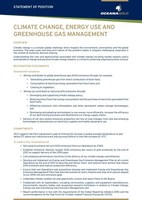OceanaGold releases new climate change position committing to net zero emissions by 2050
OceanaGold Corporation is pleased to announce it has released a position statement on climate change, including an emissions reduction goal to achieve net zero emissions from our operations by 2050.
The goal is core to OceanaGold’s environmental management strategy to mitigate the risks associated with climate change, establish measures and targets to improve the efficiency of its energy use and to …
OceanaGold Corporation (TSX: OGC) (ASX: OGC) is pleased to announce it has released a position statement on climate change, including an emissions reduction goal to achieve net zero emissions from our operations by 2050.
The goal is core to OceanaGold’s environmental management strategy to mitigate the risks associated with climate change, establish measures and targets to improve the efficiency of its energy use and to minimise its greenhouse gas (GHG) emission intensity.
Michael Holmes , President and CEO of OceanaGold said, “OceanaGold has been strongly committed to responsible mining for 30 years, and with current emissions lower than global industry average, we are already on the journey to reduce our carbon footprint.”
“OceanaGold fully supports the Paris Agreement’s goal of limiting the increase in global average temperature to well below 2°C above pre-industrial levels. In line with this objective, we are setting a goal to achieve net zero GHG emissions from our operations by 2050, and we will establish milestone intensity targets (GHG emissions per ounce of gold produced) by 2022 to support this goal,” Mr Holmes said.
Delivery of net zero carbon emissions production will rely on step changes from new and emerging technologies to decarbonise OceanaGold’s electricity supplies and mobile equipment use and incrementally improving energy use, efficiency and reducing energy consumption.
Since 2018, OceanaGold has been implementing a company-wide program of automation, digital and process transformation called ADaPT, which is helping define the Company’s journey to operate the mines of the future.
“Digital transformation presents an industry-wide opportunity to enhance performance and reduce impact. Successful implementation of the rapid advances in technology, innovation, automation, digitisation and electrification are central to achieving OceanaGold’s commitment to reduce our environmental impact,” Mr Holmes said.
OceanaGold has established a roadmap of strategic actions to help reduce its carbon footprint and improve energy management, including:
- Setting the goal to achieve net zero GHG emissions by 2050
- Establishing milestone interim emission targets by the end of 2021, linked to employment performance incentives
- Establishing a climate change Technical Coordinating Committee to identify opportunities to reduce GHG emission intensity and identify risks, opportunities, priorities and costs across OceanaGold
- Undertaking climate change management and reporting to meet the requirements of the Task Force on Climate-related Financial Disclosures (TCFD)
Targets will be achieved through the implementation of four key strategic areas: improved energy efficiency and energy reduction; decarbonisation of electrical energy supply; decarbonisation of mobile equipment fuel; and carbon sequestration.
The full position statement is available on the OceanaGold website at https://oceanagold.com/sustainability/environmental-management/emissions-and-energy-use/
Authorised for release to market by Acting Company Secretary, Chris Hansen .
About OceanaGold
OceanaGold is a multinational gold producer committed to the highest standards of technical, environmental and social performance. For 30 years, we have been contributing to excellence in our industry by delivering sustainable environmental and social outcomes for our communities, and strong returns for our shareholders. Our global exploration, development, and operating experience has created an industry-leading pipeline of organic growth opportunities and a portfolio of established operating assets including Didipio Mine in the Philippines ; Macraes and Waihi operations in New Zealand ; and Haile Gold Mine in the United States of America .
CLIMATE CHANGE, ENERGY USE AND GREENHOUSE GAS MANAGEMENT
OVERVIEW
Climate change is a complex global challenge which impacts the environment, communities and the global economy. The large-scale and long-term nature of the problem makes it uniquely challenging, especially in the context of economic decision making.
Understanding the risks and opportunities associated with climate change including market impacts, policy and legislative change and physical climate change impacts, is critical to sustaining ongoing business success.
RECOGNITION STATEMENTS
OceanaGold recognises:
- Mining contributes to global greenhouse gas (GHG) emissions through, for example:
- Generating greenhouse gas from direct combustion of fossil fuels;
- Consumption of electrical energy generated from fossil fuels; and
- Clearing of vegetation.
- Mining can contribute to reducing GHG emissions through:
- Developing and supporting climate change policy;
- Reducing direct fossil fuel energy consumption and the purchase of electricity generated from fossil fuels;
- Offsetting emissions with reforestation and other permanent carbon storage technologies; and
- Developing and adopting technologies to use energy more efficiently, increase the efficiency of our gold mining processes and decarbonise our energy supply chains.
- Delivery of net zero carbon emissions production will rely on step changes, from new and emerging technologies to decarbonise our electricity supplies and mobile equipment use.
COMMITMENTS
OCG supports the Paris Agreement’s goal of limiting the increase in global average temperature to well below 2°C above pre-industrial levels and pursuing efforts to limit the increase to 1.5°C.
To achieve this, OceanaGold will:
- Set a goal to achieve net zero GHG emissions from our Operations by 2050.
- Establish milestone intensity targets (GHG emissions per ounce of gold produced) by the end of 2021 to support delivery of the 2050 goal;
- Link employee performance incentives to the delivery of our climate change commitments;
- Develop and implement an Energy and Greenhouse Gas Emissions Management Plan at all current Operations by the end of 2021 to describe and deliver short- and medium-term actions that reduce GHG emissions and improve production efficiency;
- Ensure that new Operations and acquisitions develop and implement Energy and Greenhouse Gas Emissions Management Plans that describe and deliver short, medium and long-term actions aligned to our 2050 net zero emissions goal;
- Undertake climate-related risk and opportunity reviews and report these to the Board;
- Collaborate with all stakeholders, including communities, suppliers and equipment manufacturers, Governments, industry bodies and recognised research institutions in relation to Climate Change, Energy Use and Greenhouse Gas Emissions Management; and
Report performance in line with the requirements of the Global Reporting Initiative (GRI) and the recommendations of the Task Force for Climate-related Financial Disclosure (TCFD).
SOURCE OceanaGold Corporation

![]() View original content to download multimedia: https://www.newswire.ca/en/releases/archive/November2020/18/c0726.html
View original content to download multimedia: https://www.newswire.ca/en/releases/archive/November2020/18/c0726.html
News Provided by Canada Newswire via QuoteMedia







